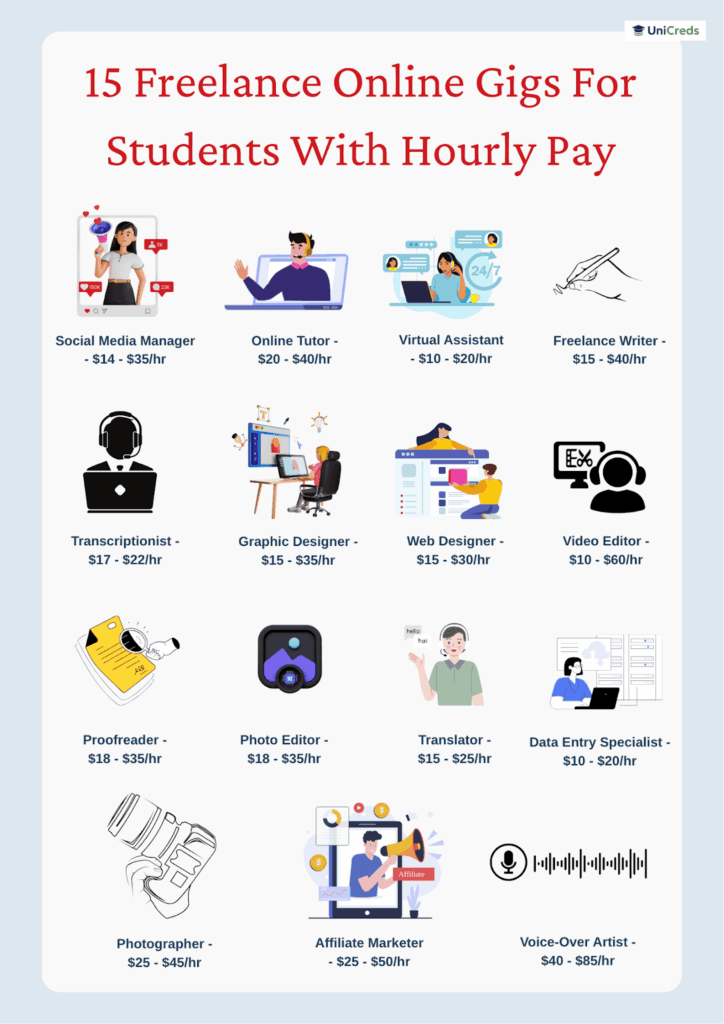Table of Contents
In 2025, the world of freelance work is more accessible than ever, providing international students with a diverse range of online job opportunities.
Freelancing is not just a way to earn extra income; it’s also an excellent platform to develop valuable, in-demand skills and gain real-world experience while balancing your studies.
This guide highlights the top freelance gigs online for students, outlines the essential skills needed to excel in each role, and offers practical advice on managing your workload effectively alongside academic commitments.
Who is a Freelancer?
A freelancer is a self-employed professional who offers specialised services to multiple clients on a project or contract basis, without being tied to a single employer or working full-time for one organisation.
Unlike traditional employees, freelancers operate as independent contractors, managing their own schedules, client relationships, and financial responsibilities such as invoicing and taxes.
Their work scope can vary widely, including fields like content creation, graphic design, web development, consulting, and digital marketing.
Freelancers enjoy significant autonomy, choosing which projects to accept, setting their own rates, and often working remotely from anywhere in the world as long as they have a reliable internet connection.
This flexibility allows them to balance work and lifestyle preferences, making freelancing an appealing career path for many, especially younger generations.
Top 15 Freelance Jobs Online for Students Abroad in 2025

- Social Media Manager
Average pay: $14 – $35/hr
As a Social Media Manager, you’ll help brands boost their digital presence by creating and posting engaging content, scheduling updates across platforms, responding to followers, and running ad campaigns. You may analyse analytics to improve performance, manage social communities, and use creative and strategic skills to achieve a client’s marketing and communication goals. This role offers flexibility, creativity, and practical experience for marketing or communications majors.
Skills needed:
- Graphic design
- Copywriting
- Social media platform expertise
- Analytics & reporting
- Community management
- Video editing
- Online Tutor
Average pay: $20 – $40/hr
As an online tutor, you’ll teach subjects ranging from mathematics and languages to creative programs like Photoshop through video calls or tutoring platforms. You’ll prepare lesson materials, work with learners of various ages (from grade school to adults), track student progress, and customise sessions to meet their needs. This job is not only rewarding – helping others learn – but also lets you reinforce your own knowledge and schedule sessions around your academic calendar.
Skills needed:
- Subject expertise
- Communication
- Patience
- Organization
- Proficiency with online tools
- Virtual Assistant
Average pay: $10 – $20/hr
Virtual Assistants support professionals and businesses remotely, handling everything from managing inboxes, scheduling meetings, and organising files, to conducting research and social media updates. You’ll be responsible for a wide range of administrative tasks, allowing you to develop your organisational and communication skills while networking with industry professionals – all on a flexible schedule that fits your classes.
Skills needed:
- Time management
- Organization
- Data entry
- Communication
- Email & calendar tools
- Freelance Writer
Average pay: $15–$40/hr
As a Freelance Writer, you’ll research topics, create engaging articles, blog posts, scripts, or marketing copy, and edit or proofread material for clarity and accuracy. You get to work with brands, publications, and creators in many industries, choosing projects that match your interests and building a diverse portfolio – all while enjoying the freedom to work from anywhere.
Skills needed:
- Research
- Creativity
- Editing
- SEO basics
- Time management
- Transcriptionist
Average pay: $17 – $22/hr
Transcriptionists convert audio recordings—such as meetings, podcasts, or interviews—into precise, written documents. You’ll listen carefully to recordings and type out transcripts, proofread for accuracy, and meet deadlines for each project. This detail-focused, output-based assignment is excellent for students who prefer flexible, independent work they can do on their schedule.
Skills needed:
- Fast, accurate typing
- Grammar and spelling
- Listening
- Attention to detail
- Graphic Designer
Average pay: $15 – $35/hr
As a Graphic Designer, you’ll use creative skills to develop visual materials like logos, infographics, banners, and marketing ads. You’ll work with design software, collaborate with clients to understand their needs, and edit imagery or layouts to create eye-catching graphics. This is an ideal field for visually-oriented and artistic students who want to build a standout portfolio while gaining real-world project experience.
Skills needed:
- Adobe Creative Suite or Canva
- Typography & colour theory
- Creativity
- Time management
- Web Designer
Average pay: $15 – $30/hr
Web Designers craft user-friendly and visually appealing websites and landing pages, using both design and technical skills. You’ll work on layout, colors, and navigation, implement changes using HTML/CSS or site builders, and ensure mobile responsiveness. Taking on a web design side job enables you to apply what you learn in class, build your professional portfolio, and get hands-on experience for a future tech career.
Skills needed:
- UI/UX design
- HTML & CSS
- Graphic design tools
- Problem-solving
- Video Editor
Average pay: $10 – $60/hr
Video Editors take raw video footage and transform it into polished, engaging content for YouTubers, companies, or advertisers. Your tasks include cutting and splicing clips, syncing audio, adding special effects, captions, and improving colour or sound quality. This flexible, creative role helps you develop sought-after skills while working with clients across diverse industries.
Skills needed:
- Editing software (Premiere, Final Cut)
- Audio mixing
- Motion graphics basics
- Storytelling
- Proofreader
Average pay: $18 – $35/hr
Proofreaders review and correct written work, looking for spelling, grammar, style, and formatting errors. You’ll work on everything from blogs and manuscripts to product descriptions, ensuring the final content is error-free and professional. For students with a strong command of language and attention to detail, this job is easy to fit around coursework.
Skills needed:
- Grammar and punctuation
- Style guide knowledge
- Editing tools
- Attention to detail
- Photo Editor
Average pay: $18 – $35/hr
As a Photo Editor, you’ll use software to improve and alter images for marketing, social media, or journalism clients. You’ll adjust lighting, retouch flaws, manage color and composition, and help deliver a client’s visual message. It’s a flexible side hustle for creatively-minded students looking to work from home and expand their digital portfolio.
Skills needed:
- Photo editing software
- Image manipulation
- Color correction
- File management
- Translator
Average pay: $15 – $25/hr
Translators convert written or audio content from one language to another, ensuring the original meaning is preserved and culturally relevant. You might translate documents, subtitles, or marketing material for global companies and publishers, often juggling multiple projects in different industries. Bilingual or multilingual students will find this role financially rewarding and adaptable to their schedules.
Skills needed:
- Fluency in two+ languages
- Cultural awareness
- Language and grammar proficiency
- Data Entry Specialist
Average pay: $10 – $20/hr
Data Entry Specialists input, update, and organise information into digital systems for businesses large and small. Your duties include entering data in spreadsheets, ensuring accuracy, checking for errors, and occasionally helping convert or format information for reporting. This entry-level job is popular with students needing simple, remote work and a steady income stream.
Skills needed:
- Fast typing
- Detail orientation
- Spreadsheet software
- Photographer
Average pay: $25 – $45/hr
Photographers capture and edit images for clients, including local businesses, events, and online marketplaces. You’ll plan shoots, compose shots, set up lighting, use editing tools, and deliver final images. This job combines creativity and entrepreneurship, and is well-suited to students interested in building both a side income and a professional portfolio.
Skills needed:
- Camera equipment proficiency
- Photo composition & staging
- Editing and retouching
- Affiliate Marketer
Average pay: $25 – $50/hr
Affiliate Marketers earn commissions by promoting products or services through blogs, social media, or email, using special tracking links. You’ll analyse which strategies convert best, negotiate with brands or influencers, and help optimise campaigns to drive sales. This is a great remote job for students seeking passive income and flexibility, especially those savvy in digital marketing or content creation.
Skills needed:
- Online marketing
- SEO
- Analytics
- Content creation
- Voice-over Artist
Average pay: $40 – $85/hr
Voice-over Artists provide narration or character voices for ads, explainer videos, animations, and games. You’ll read scripts, record in a quiet space (often your own home or school booth), and deliver high-quality audio tailored to each project’s needs. This job suits creative students with strong vocal skills and offers competitive pay for project-based work you can fit around your studies.
Skills needed:
- Voice control and clarity
- Acting
- Timing and pacing
- Recording software
Also read: 7 Best Jobs To Work Remotely
How to Start Freelancing as an International Student?
Embarking on your freelance journey as a student abroad can be transformative with a strategic approach:
- Reflect on Your Strengths and Goals:
Take stock of transferable skills (academic, extracurricular, personal). Identify passions and strengths that can be translated into freelance offerings. Focus on a service you can genuinely add value to.
- Professional Online Presence:
Craft compelling profiles on reputable freelance platforms. Use a professional headshot, a concise biography, and showcase any experience (even if voluntary or academic). Build credibility with testimonials or endorsements from professors or previous clients.
- Build a Credible Portfolio:
Don’t wait for your first paid client – create sample projects, contribute to student publications, or volunteer for non-profits. Even a handful of strong, diverse samples can make the difference when pitching new clients.
- Smart Rate Setting:
Research standard freelance rates in your field and locale. Start at a level that reflects your experience, but be prepared to adjust as your reputation and skills grow.
Remember: Value is more important than being the lowest bidder.
- Strategic Client Outreach:
Tailor each proposal or pitch to the job, focusing on how your skills solve the client’s specific challenges. Persistence, attention to detail, and follow-ups are often rewarded with opportunities.
- Master Your Work Schedule:
Integrate freelance commitments around your academic calendar. Utilise automation tools, alarms, and regular check-ins to monitor progress, particularly during peak university periods.
- Act with Professional Integrity:
Treat freelancing with the same seriousness as any traditional job: set boundaries, stick to deadlines, and own up to mistakes promptly. Ethical conduct helps in building a trusted reputation.
- Pursue Continuous Improvement:
Solicit feedback after each completed project and use it to refine your service. Stay current with trends in your niche by subscribing to industry newsletters, joining forums, or taking online courses.
Benefits Of Online Jobs as a Student
- True Flexibility:
Tailor work hours around academic obligations, extracurriculars, and personal life. This allows for high productivity without sacrificing study or social time.
- Global Opportunities:
Work with clients, businesses, and peers from across the world, broadening your cultural outlook and adaptability.
- Professional Skill Building:
Gain in-demand skills such as project management, digital collaboration, client negotiation, and problem-solving, which are valuable in any career trajectory.
- Enhanced Employability:
Building a portfolio of real-world projects provides experience that sets you apart from other graduates and demonstrates initiative to future employers.
- Financial Independence:
Supplement living expenses, tuition, or travel, easing financial pressures without the rigidity of on-campus jobs.
- Career Path Discovery:
Explore various sectors and roles inexpensively before dedicating to a specific career, helping clarify long-term goals.
- International Networking:
Develop a network of references, mentors, and collaborators that can serve as a stepping stone for internships, full-time roles, or further freelance gigs online.
- Language and Soft Skill Enhancement:
Regular interaction with diverse clients sharpens language skills, cross-cultural understanding, and professionalism.
Also read: Quick and Effective Job Searching Tips
Freelancing gigs offer students an exceptional opportunity to earn income, gain valuable skills, and build professional experience while maintaining the flexibility to balance academic responsibilities.
Whether your strengths lie in writing, design, tutoring, or technical roles, the diverse freelance jobs available today can help you grow your portfolio, develop in-demand skills, and explore career paths before graduation.
By leveraging online platforms and your unique talents, you can create a rewarding freelance career that complements your studies and sets the foundation for your future success.
FAQs
1. Do I need experience to start freelancing as a student?
No, many online freelance jobs, such as data entry, tutoring, or transcription, are beginner-friendly and require little to no prior experience. You can start by showcasing projects from coursework, internships, or personal passion projects to help build your initial portfolio.
2. How do I find genuine freelance jobs online?
Begin by registering on trusted platforms like Upwork, PeoplePerHour, or Fiverr. Search for roles with clear job descriptions and verified client profiles. Avoid jobs that ask for upfront payment or make promises that sound too good to be true.
3. How can I build a freelance portfolio as a student?
Start with class assignments, personal projects, or volunteer work – these all count! Create samples that demonstrate your skills (like writing, design, or coding) and showcase them on a professional site or portfolio profile. As you complete client work, add those pieces with the client’s permission.
4. What’s the best way to balance freelancing with my studies?
Set realistic expectations for your workload and use project-based or part-time gigs that allow flexible scheduling. Prioritise your academic responsibilities and communicate availability with clients in advance to avoid overcommitment.
5. How do I get my first freelance client?
Highlight your skills and passion in your freelance platform profile. Tailor each job proposal to show an understanding of the client’s needs and provide relevant examples or samples. Persistence and professionalism are key – be patient as you build reviews and credibility!










0 Comments